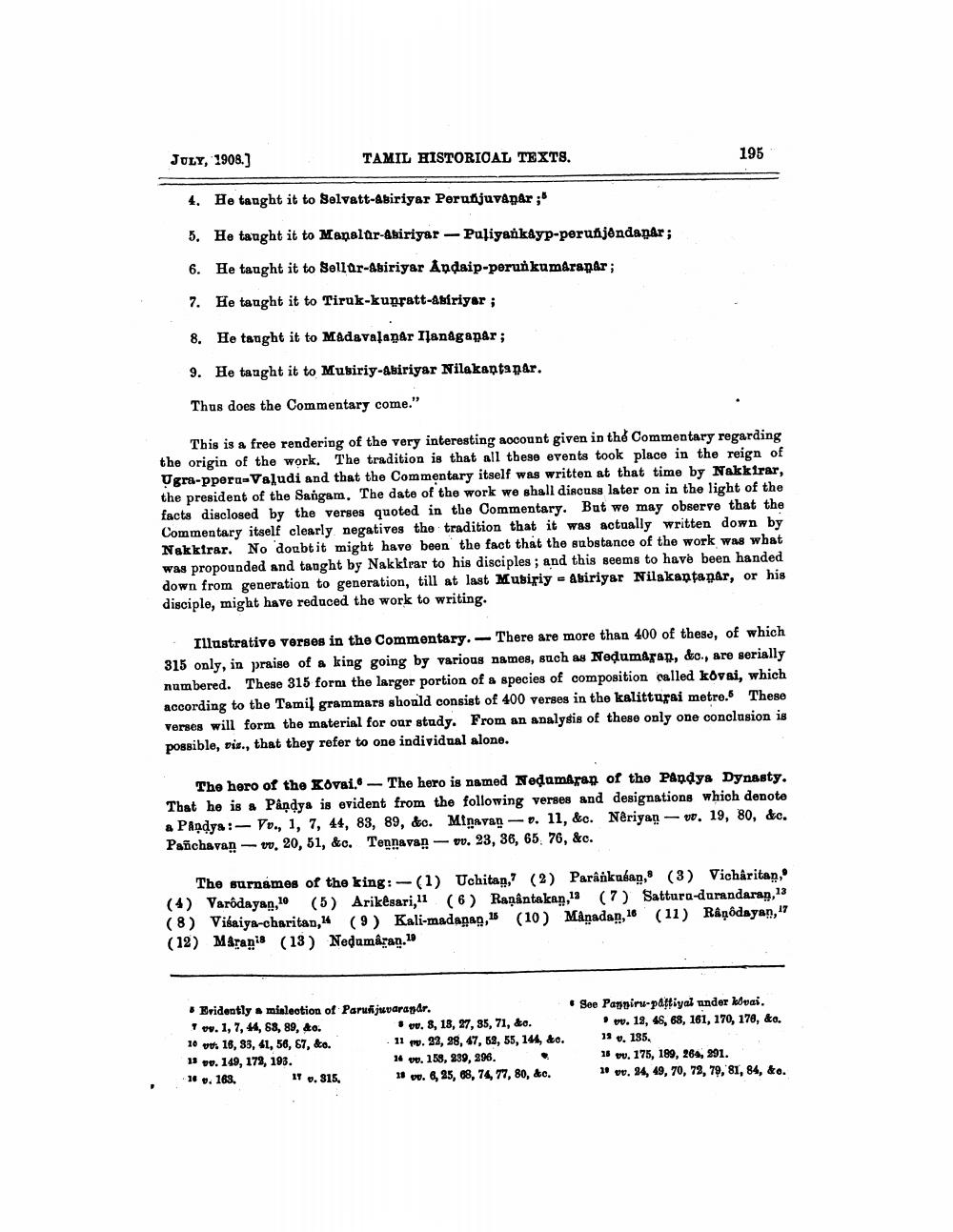________________
TAMIL HISTORICAL TEXTS.
JULY, 1908.]
4. He taught it to Selvatt-asiriyar Perunjuvanar;"
5.
He taught it to Manalar-asiriyar - Puliyankayp-peruñjendanar;
6. He taught it to Sellar-asiriyar Andaip-perunkumaraṇār;
7.
He taught it to Tiruk-kunratt-asiriyar ;
8. He taught it to Madavalanar Ilanaganar;
9. He taught it to Musiriy-asiriyar Nilakantanar.
Thus does the Commentary come."
This is a free rendering of the very interesting account given in the Commentary regarding the origin of the work. The tradition is that all these events took place in the reign of Ugra-ppera-Valudi and that the Commentary itself was written at that time by Nakkirar, the president of the Sangam. The date of the work we shall discuss later on in the light of the facts disclosed by the verses quoted in the Commentary. But we may observe that the Commentary itself clearly negatives the tradition that it was actually written down by Nakkirar. No doubt it might have been the fact that the substance of the work was what was propounded and taught by Nakkirar to his disciples; and this seems to have been handed down from generation to generation, till at last Musiriyasiriyar Nilakantanar, or his disciple, might have reduced the work to writing.
Illustrative verses in the Commentary. There are more than 400 of these, of which 315 only, in praise of a king going by various names, such as Nedumaran, &c., are serially numbered. These 315 form the larger portion of a species of composition called kovai, which according to the Tamil grammars should consist of 400 verses in the kalitturai metre. These verses will form the material for our study. From an analysis of these only one conclusion is possible, viz., that they refer to one individual alone.
The hero of the Kovai. The hero is named Nedumaran of the Pandya Dynasty. That he is a Pandya is evident from the following verses and designations which denote a Pandya: Vv., 1, 7, 44, 83, 89, &c. Minavan - -v. 11, &c. Nêriyan- vv. 19, 80, &c. Panchavan - vv. 20, 51, &c. Tennavan vv. 23, 36, 65, 76, &c.
—
195
-
Evidently a mislection of Paruñjuvaraṇār.
7 vv. 1, 7, 44, 68, 89, &o.
10 v. 16, 35, 41, 56, 67, &o. 13 vv. 149, 172, 193. 16. 163.
17 v. 315,
The surnames of the king: -(1) Uchitan, (2) Parânkaéan, (3) Vicharitan, (4) Varôdayan,10 (5) Arikêsari,11 (6) Ranântakan,13 (7) Sattura-durandaran, 13 (8) Visaiya-charitan, (9) Kali-madanan, 15 (10) Mânadan, 16 (11) Râpôdayan, 17 (12) Maranis (13) Nedumaran.19
vv. 8, 18, 27, 35, 71, &c. 11. 22, 28, 47, 52, 55, 144, &c. 14 vv. 158, 239, 296.
18 vv. 6, 25, 68, 74, 77, 80, &c.
See Panniru-paṭṭiyal under kovai.
vv. 12, 4S, 68, 161, 170, 176, &o. 135.
13
15 vv. 175, 189, 264, 291.
1 vv. 34, 49, 70, 72, 79, 81, 84, &c.




